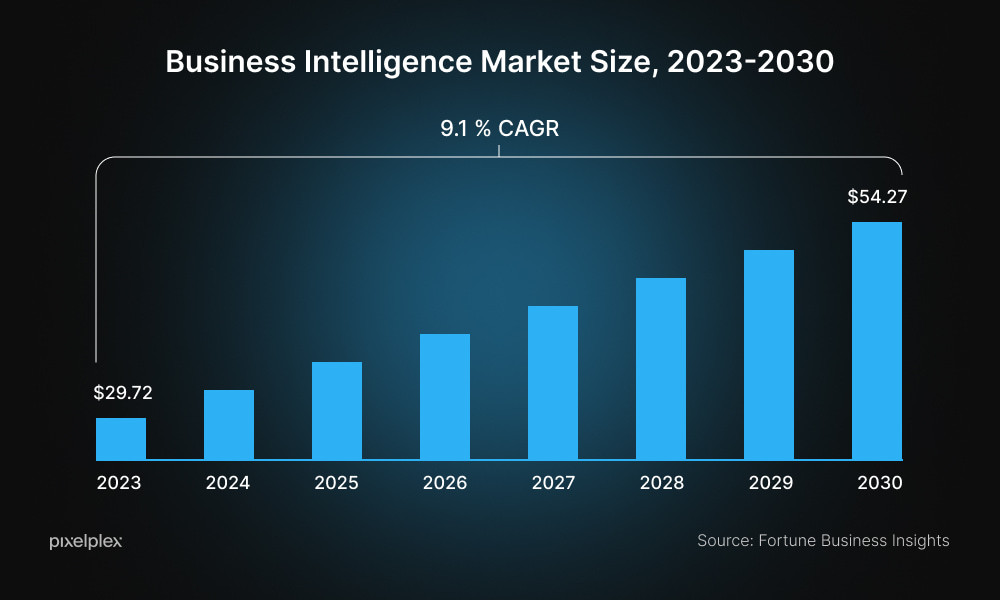The global business intelligence (BI) software market is experiencing rapid growth, fueled by the increasing need for data-driven decision-making across industries. This demand is driven by factors such as the rise of big data, the increasing adoption of cloud computing, and the growing need for real-time insights. The market is projected to reach a staggering $30 billion by 2025, signifying a significant upward trajectory. This article delves into the key trends and challenges shaping the future of the BI software market, highlighting the opportunities and potential roadblocks for businesses operating in this space.
The Rise of Data-Driven Decision-Making
Data is the new oil, and businesses are increasingly realizing the immense value of harnessing it for informed decision-making. BI software enables businesses to collect, analyze, and interpret vast amounts of data, revealing hidden patterns and trends that can inform strategic decisions. This data-driven approach to decision-making is crucial for businesses to gain a competitive edge in today's dynamic market.
Key Drivers of Market Growth
Several key factors are driving the growth of the BI software market. These include:
- The Rise of Big Data: The explosion of data generated by various sources, including social media, IoT devices, and mobile apps, has created an unprecedented need for effective tools to analyze and extract insights. BI software plays a crucial role in handling this data deluge, enabling businesses to turn raw data into actionable intelligence.
- Cloud Computing Adoption: The shift toward cloud-based solutions has made BI software more accessible and affordable for businesses of all sizes. Cloud-based BI platforms offer scalability, flexibility, and cost-effectiveness, making them an attractive option for businesses looking to implement data analytics solutions.
- Increased Need for Real-Time Insights: In today's fast-paced business environment, businesses need real-time insights to make quick and informed decisions. BI software enables real-time data analysis and reporting, providing businesses with the information they need to respond effectively to changing market dynamics.
- The Growing Importance of Data Visualization: Data visualization tools play a key role in making data accessible and understandable for a wider audience. BI software incorporates powerful data visualization capabilities that enable businesses to present complex data in clear, concise, and visually appealing formats, facilitating better communication and understanding.
- Artificial Intelligence (AI) and Machine Learning (ML): AI and ML are transforming the BI landscape, enabling automated data analysis and predictive insights. BI software platforms are increasingly incorporating AI and ML capabilities, empowering businesses to gain deeper insights and make more accurate predictions about future trends.
Key Challenges and Opportunities
While the BI software market is experiencing significant growth, it also faces certain challenges. These include:
- Data Security and Privacy Concerns: As businesses collect and analyze vast amounts of data, ensuring data security and privacy becomes paramount. Data breaches and privacy violations can damage a company's reputation and lead to significant financial losses. Implementing robust data security measures and adhering to privacy regulations are crucial for BI software vendors and their clients.
- Data Integration Challenges: Integrating data from multiple sources can be a complex and time-consuming process. Businesses need to overcome data integration challenges to ensure accurate and consistent data analysis. This can be achieved through data quality management and the use of data integration tools.
- Skill Gap: The demand for skilled data analysts and BI professionals is growing rapidly. However, there is a shortage of qualified professionals in the market. Businesses need to invest in training and development programs to bridge this skills gap and ensure they have the talent needed to effectively utilize BI software.
Despite these challenges, the BI software market presents numerous opportunities for businesses. These include:
- Growing Demand for Advanced Analytics: Businesses are increasingly seeking advanced analytics capabilities to uncover deeper insights and make more informed decisions. This creates an opportunity for BI software vendors to develop and offer innovative solutions that address these needs.
- Focus on Customer Experience: Businesses are using BI software to gain a deeper understanding of their customers and enhance the customer experience. This involves analyzing customer data to identify preferences, trends, and pain points. BI software can help businesses personalize their offerings and provide better customer service.
- Emerging Technologies: The integration of AI, ML, and other emerging technologies into BI software is opening up new possibilities for businesses. These technologies can automate data analysis tasks, generate predictive insights, and enable real-time decision-making.
The Future of the BI Software Market
The BI software market is poised for continued growth, driven by the increasing adoption of data-driven decision-making across industries. The market is expected to be shaped by several key trends, including:
- Increased Focus on Cloud-Based Solutions: Cloud-based BI platforms will continue to gain popularity due to their scalability, flexibility, and cost-effectiveness.
- Rise of Self-Service BI: Self-service BI tools are empowering business users to access and analyze data without relying on IT professionals. This trend will continue to grow, democratizing data access and enabling data-driven decision-making across the organization.
- Integration of AI and ML: The integration of AI and ML capabilities into BI software will further enhance data analysis and provide more accurate predictive insights.
- Growing Importance of Data Ethics: As data becomes increasingly important, businesses are focusing on data ethics, ensuring responsible data collection and usage. This will shape the development and adoption of BI software.
The BI software market is a rapidly evolving landscape, offering significant opportunities for businesses to gain a competitive edge through data-driven decision-making. As businesses continue to embrace data-driven strategies, the demand for BI software is expected to remain strong in the years to come. By understanding the key trends and challenges shaping the market, businesses can effectively navigate this evolving landscape and unlock the full potential of data analytics.
The Final Word: Data is Power
In the digital age, data has become a crucial asset for businesses. BI software empowers businesses to leverage this asset, transforming data into valuable insights that can drive growth and success. As businesses continue to embrace data-driven decision-making, the BI software market is set to continue its upward trajectory, shaping the future of business intelligence.

















